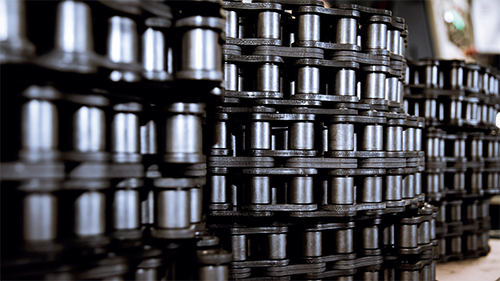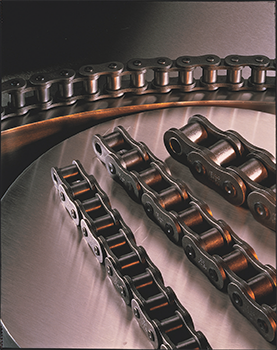Being the oldest in your sector doesn’t come without the requisite expertise, as Renold proves
Established in 1879 by Hans Renold, Renold is the oldest transmission chain company in the world. The following year saw Hans, who had emigrated from Switzerland to the UK, introduce the patented innovation of the solid bush. This was the origin of the bush roller chain that is still used today, globally, in a large number of applications. Although his early innovations were relatively simple, Hans soon started to develop his own designs and manufacturing technologies. He also expanded his knowledge, and company, through the acquisition of similar manufacturers in the chain-production market. Within its first 30 years, Renold obtained a vast catalogue of patents and really set the bar for the chain industry going into the next century. Today, the business’ HQ is based in Manchester, but its international reach stretches across 20 countries. It serves a versatile collection of sectors, including subways, power plants, escalators across a number of industries, and chocolate and cement production.
 Among its many overseas expansions, in 1963, the company established Renold GmbH (GmbH) through the purchase of Arnold and Stolzenberg GmbH of Einbeck, one of the oldest and largest chain manufacturers in Germany. Today, the Einbeck site is the company’s largest production facility, in terms of revenue, and it’s the base from where Daniel Seubold, Operations Director, speaks to Manufacturing Today: “Chain production is our mainstay, with regards to output and income. However, our secondary branches are gearboxes and couplings. Hans Renold was a true pioneer of the industry; his designs carried a higher degree of accuracy and quality than anyone had seen before, with incredibly long resultant life cycles. These new and exciting innovations even required the development of new manufacturing technologies and practices.”
Among its many overseas expansions, in 1963, the company established Renold GmbH (GmbH) through the purchase of Arnold and Stolzenberg GmbH of Einbeck, one of the oldest and largest chain manufacturers in Germany. Today, the Einbeck site is the company’s largest production facility, in terms of revenue, and it’s the base from where Daniel Seubold, Operations Director, speaks to Manufacturing Today: “Chain production is our mainstay, with regards to output and income. However, our secondary branches are gearboxes and couplings. Hans Renold was a true pioneer of the industry; his designs carried a higher degree of accuracy and quality than anyone had seen before, with incredibly long resultant life cycles. These new and exciting innovations even required the development of new manufacturing technologies and practices.”
As a result of its continuous improvements, Renold possesses a great depth to its manufacturing capabilities. In the GmbH facility, for the majority of the products, the only inbound components are raw materials from which the team produces every single element of its chains. Its inhouse technologies include the likes of blanking, extrusion, heat treatment, CNC machining capabilities, tumbling and laser cutting. This self-sufficiency allows the business to be flexible and responsive in the manufacture of guaranteed, high-quality products. For assembly, there is a combination of manual, fully and semi-automated production lines that incorporate the use of robotics.
“In completing everything ourselves, we are free to commit to batches of any size to cater to our customers’ needs,” Daniel says. “We also have absolute control over the final quality of our goods, as everything is 100-percent managed and inspected inhouse by our process-specific departments. All of this puts us in an excellent position in terms of our supply chain. As long as we can obtain raw materials, usually sourced in Einbeck, or, elsewhere in Germany or Europe, there is little else that can challenge our resilience to market disruptions. That’s the beauty of having such a strong local supply chain. Arguably, if we had followed the actions of others and globalized GmbH’s operations years ago, we would have struggled a lot more during the pandemic.”
Meeting the demand
Looking at the bigger picture, the wider organization of Renold has recently acquired a company in Spain called YUK. In following the trends of Hans Renold’s earlier moves, YUK is also a manufacturer and distributor of high-quality conveyor chains (CVCs) and ancillary products. The acquisition is set to not only expand the company’s physical volume, but also its product range – as YUK is capable of manufacturing its specialized CVCs on short lead times to meet customer demands. Its locale will also offer Renold the southern Europe location that it’s been looking for; complete with warehousing and distribution capabilities, and the opportunity to reduce transportation related emissions throughout the continent.
Beyond manufacturing
Renold’s keen application of its green strategies and strong working culture is reflected by GmbH’s practices, as Daniel explains: “In my opinion, the quality of our products alone contributes towards the future, given that they have a longer lifespan that that of our competitors. They require less maintenance and fewer replacements, which also means more up-time for plants, and an overall lower carbon footprint for our consumers, as we have honed our production methods to lower our waste and emissions. In scenarios where reductions aren’t possible, for instance with our 1000-centigrade furnace, we focus more on how we can optimize the operations and their requirements. To complement these energy savings, we’re also in the process of exploring our energy generating capacity, for example by installing solar panels on our rooftops, and other sources of renewable energy.”
On the social side of its ESG initiatives, GmbH prides itself on the diversification that its long-standing workforce brings. “We have people who’ve worked here for decades, who possess the wealth of knowledge that keeps us going, combined with the younger, enthusiastic generation who add an active dynamic to the balance. Open communication is very important to me, everybody knows that my office door is always open to answer questions, solve problems or just lend an ear,” he concludes.
www.renold.com
